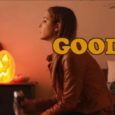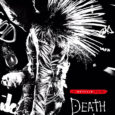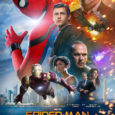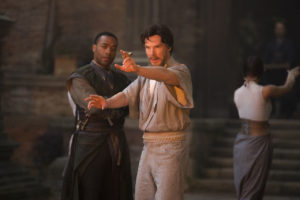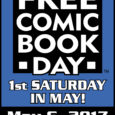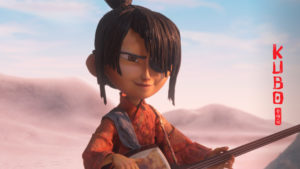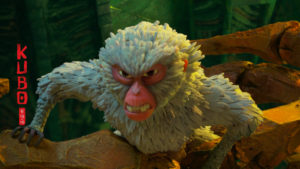If you live for the noisy blockbusters Hollywood releases every year, 2016 wasn’t a victory. Zoolander 2, Independence Day Resurgence, and even Jason Bourne disappointed audiences. However, in the independent (or indie) landscape, the cinema thrived. If you live in this layer of lower-budgeted film, you found original, thought-provoking, visually-pleasing stories like I did. In fact, there were so many winning 2016 indie films, I have conjured up several acknowledgements outside of my top 10.
Honorable Mentions
To avoid bogging down this list with even more thorough explanations, I’ll list each 2016 indie films mention with an accompanying sentence. If you’re a fan of yucking it up at the theaters, the relatable coming-of-age teen comedy The Edge of Seventeen delivers huge. Also, comedian Mike Birbiglia steps behind the camera again for another honest and funny outing with Don’t Think Twice. 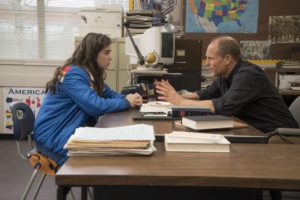
If you yearn for the unconventional approaches, The Lobster will quench that desire and then some. Director Ben Wheatley contributes a bizarre but compelling story about an apartment building gone to hell with High-Rise. The Eyes of My Mother will discomfort you but penetrate your every thought after you see it with its interesting serial killer origin tale. Always Shine throws plenty of psychologically thrilling elements at you to stick with you as well.
For those that have sappy hearts like me, the family dramedy Captain Fantastic and the romantic, reminiscing-on-old-love flick Blue Jay hit you deep in your feels. Winding down these 2016 indie films selections is an unflinching study of alcoholism in the gorgeous Krisha. Lastly, Goat shows an unpleasant side of college fraternity hell week that can’t go ignored. With those stellar titles out of the way, here’s my 10 favorite 2016 indie films!
10. Hunt for the Wilderpeople
The first movie comes from the same director as 2015’s hilarious What We Do in the Shadows. This time, writer/director Taika Waititi pursues an adventure-driven dramedy feel and sticks the landing. With Sam Neill and newcomer Julian Dennison leading the picture, nailing the tone appeared to come easy. The 2 leads have a palpable chemistry that evolves as the film proceeds. If you’re searching for laughs and heart in a film, Hunt for the Wilderpeople has an abundance of both.
9. The Invitation
The Invitation came out of nowhere, more so than any other previous or forthcoming pick. Out of these 2016 indie films, this picture is the most pulse-pounding and uncomfortable to watch. This is not due to overuse of gore, but just pure atmosphere, which director Karyn Kusama immaculately creates. More than being a horror-thriller, The Invitation serves as a study in grief and how one copes with loss, similar to Kubo & the Two Strings but much darker and with more adult-geared themes. The movie is available now to stream on Netflix, so I implore you to see what the fuss is about while it’s there.
8. Green Room
While The Invitation is uncomfortable to watch for its atmosphere, Green Room makes you squirm through its unexpected, real-feeling violence. Writer/director Jeremy Saulnier hits yet another home run here, with his first being a revenge-driven movie, Blue Ruin. Here, Saulnier manages to round out a more recognizable cast with the late Anton Yelchin and the surprisingly-creepy Patrick Stewart. The violence doesn’t exist simply to evoke unease though. Its purpose is shown through how it drastically affects our protagonists. I’m eager to dive into spoilers to further justify this film’s placement, but I’ll stop myself to recommend you catch this streaming on Amazon Prime now.
7. The Handmaiden
Director Park Chan-wook can frankly do no wrong in my eyes. He continues to live up to this with The Handmaiden, an erotic, thriller that shifts perspectives and makes you second guess what you’re watching at every possible chance. The story occurs in Japanese-controlled Korea, where a con man attempts to marry an heiress to steal her fortune. That’s the biggest oversimplification of a film that features such layered complexities, one after another. Like all of Chan-wook’s movies, this demands to be seen for one’s full appreciation. A fair warning though: at some point, this features the director’s propensity for odd, gross-out moments. Like his prior works though, those moments are absolutely earned.
6. Southside With You
For me, Southside With You was the largest surprise of the year. A movie about Barack and Michelle’s first date didn’t sound necessary or appealing. If anything, Southside had giant potential for failure. However, thanks to the brilliant casting and compelling dialogue, we instead received one of the best romance movies in the last decade or so. I have a fondness for films that opt to tell their story in a single day, and do it well. Not only that, through its writing, we’re shown many differing yet very valid perspectives on the racial climate, the business world, and the importance of community. Even if you’re not politically aligned with the subjects of Southside, you’ll still come out enjoying it.
5. Jackie
Goodness, Jackie is a beautiful film to behold. Every frame is meticulously crafted like a painting. All credit can be given to director Pablo Lorrain for captivating me so successfully and effortlessly. In addition to the enthralling sights, Natalie Portman puts in another award-worthy performance in her career as Jackie Kennedy Onassis as she experiences the single hardest moment of her life. Then there’s a whole underlying conversation the movie makes about politics bleeding its way into every facet of life, even something as personal as facing a devastating loss. Instead of grieving in private, every action you take is endlessly scrutinized. Considering this, Jackie is a feast for all the senses.
4. Sing Street
https://www.youtube.com/watch?v=C_YqJ_aimkM
I admit the placement of Sing Street is based on its personal connection to my life. In high school, I studied guitar and songwriting in every free second I had. Granted, I didn’t start that venture to “get the girl” like Conor does in this film. Nevertheless, the seemingly never-ending stream of failures after taking multiple risks is a familiar feeling that resonated with me on a large scale after my first viewing.
Director John Carney, who tackled one of my favorite musicals to ever exist titled Once, concocts one of the best coming-of-age movies of the 2010s. With the relatability comes an incredibly infectious original soundtrack. “Drive It Like You Stole It” still seeps into my brain randomly, and I saw this film more than 8 months ago. Sing Street just hit Netflix’s streaming platform, so I implore you to watch this and get some unadulterated joy in your life.
3. Hell or High Water
Sicario scribe Taylor Sheridan yet again knocks it out of the park with 2016’s Hell or High Water. As far as 2016 indie films go, an argument could be made for this title at #1. Not only is High Water the best written movie of 2016, it has one of the best performances of Jeff Bridges‘ entire career. Ben Foster shines and continues to show how Hollywood is simply out of excuses as to why he’s not a consistent leading man. Story-wise, you’re left with clammy hands and tense feelings up until the end credits. Even though this was a summer movie, there’s still consistent awards talk for this picture and it’s entirely justified.
2. Moonlight
Once again, we have another of these 2016 indie films that could be argued into the top position. Director Barry Jenkins carefully creates one of the most perfectly directed, affecting movies of the year in Moonlight. Mahershala Ali turns in a quiet performance that’ll evoke so many emotions from you. The emotional moments are endless though and rather subtle. However understated the film is as a whole, it doesn’t detract from its importance and its engaging themes that will connect with everyone universally. If you’re looking for an underdog to take the Best Picture award at the Oscars, Moonlight is it.
1. Manchester by the Sea
The giant gut-punch of a reveal and the breathtaking, touching performances seen in Manchester by the Sea elevate the movie into “best drama of the 2010s” status for me. Paired with writer/director Kenneth Lonergan‘s distinct vision, you have Casey Affleck offering up his career best, and Michelle Williams‘ vulnerability breaking us to tears. Although spoilers will help explain why Manchester is so highly regarded on my top 10 2016 indies films list, it’s imperative you experience this ride for yourself. With the movie occurring in Boston, the coarse language divvies out much of the humor, especially when our protagonists are placed in awkward encounters. I assure you it’s not all downtrodden misery, and it’s not just a performance-driven piece. Yes, heartache is very present, but these are characters you ultimately root for and identify with in meaningful ways.
If these heavy-lifting, fascinating, inventive dramas are indicative of anything, it’s that the state of cinema is healthy. With an eye to 2017, we have plenty of more promising blockbusters to anticipate like a new Christopher Nolan film, another Blade Runner film, and of course another Star Wars episode. It may be harder for indies to eclipse those pictures in quality or excitement levels, but like 2016, the gems will be there if you seek them out.
It’s unfortunate that we rarely receive honest, hilarious, relatable coming-of-age films nowadays. Luckily, when films like The Edge of Seventeen come along, they get the deserved attention. Seventeen has a familiar premise, but thanks to writer/director Kelly Fremon Craig‘s perspective, it conversely has a fresh approach. Because of the strong writing and performances, Seventeen lives in a class among the best like Mean Girls, Clueless, and Easy A.
To summarize, The Edge of Seventeen follows awkward high school student Nadine (Hailee Steinfeld) as she tries to create a social life for herself. Her best friend Krista (Haley Lu Richardson) starts dating her older brother (Blake Jenner), which drives a rift between the three. In the interim, Nadine befriends a more-awkward, show-stealing kid named Erwin (Hayden Szeto). She also seeks occasional advice from unconventional, crass teacher Mr. Bruner (Woody Harrelson).
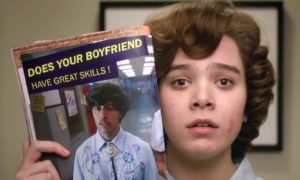 As you read through my synopsis, you should recognize certain plot aspects. We’ve seen an uncomfortable teenager flounder through adolescence on film before. The witty, sometimes-rude teacher isn’t a new idea. The unassuming romance is definitely a trope in teen movies. However, the originality in dialogue and unique traits Nadine, Erwin, and Mr. Bruner possess elevate the film.
As you read through my synopsis, you should recognize certain plot aspects. We’ve seen an uncomfortable teenager flounder through adolescence on film before. The witty, sometimes-rude teacher isn’t a new idea. The unassuming romance is definitely a trope in teen movies. However, the originality in dialogue and unique traits Nadine, Erwin, and Mr. Bruner possess elevate the film.
To obtain some appreciation for The Edge of Seventeen, I implore you to watch the hilarious red band trailer above. The charming, vulgar humor is immediately apparent and appreciated. This isn’t just true for the trailer, but for the entire feature. In the vein of Superbad, kids curse, and curse often in reality, but in Seventeen, conversations feel more realistic. Instead of aiming for the best gut-busting one-liner, the comedy flick opts for believability in its word choices.
Although the laughs are plentiful at the start, the final third act attempts to be poignant. While Nadine’s arc feels fulfilling, the resolution feels rather predictable and sudden. If you’ve seen one teen movie and watch The Edge of Seventeen trailer, you can guess the film’s ending easily. However, I feel the writing short-changes a particular character on closure that the audience would have welcomed. Regardless, the first two-thirds of the movie balance witty humor and character depth to cover for any finale weaknesses.
Backtracking to the performances, The Edge of Seventeen can certainly brag about its central cast. Hailee Steinfeld’s effortless skills would take years for any other actor to master. Woody Harrelson is impeccably utilized as the charismatic, sometimes-crude teacher. The star-making performance ultimately belongs to Hayden Szeto as Erwin Kim. He’s a love interest unlike any other in the teen comedy/coming-of-age genre. He acts so convincingly uncomfortable in his own body when trying to speak to Nadine. In every nervous twitch and stutter, I saw so much of my adolescent self in Erwin Kim. That earns the timid kid a spot as one of my favorite teen comedy characters to ever exist.
 While the central cast’s performances are a bright enough highlight to drown out any criticisms, said criticisms still remain among the supporting cast. Kyra Sedgwick as Nadine’s eccentric mother, Mona, feels slightly mishandled. I’m unsure how the regular moviegoing audience will feel, but I yearned for more meaningful interactions between Nadine and Mona. Also, unfortunately Blake Jenner as Nadine’s older brother Darian simply couldn’t measure up to Hailee’s acting prowess when necessary. Haley Lu Richardson as Nadine’s best friend Krista eventually became moving background furniture after the first half of the movie. At times, I needed reminding that Nadine and Krista were even best friends.
While the central cast’s performances are a bright enough highlight to drown out any criticisms, said criticisms still remain among the supporting cast. Kyra Sedgwick as Nadine’s eccentric mother, Mona, feels slightly mishandled. I’m unsure how the regular moviegoing audience will feel, but I yearned for more meaningful interactions between Nadine and Mona. Also, unfortunately Blake Jenner as Nadine’s older brother Darian simply couldn’t measure up to Hailee’s acting prowess when necessary. Haley Lu Richardson as Nadine’s best friend Krista eventually became moving background furniture after the first half of the movie. At times, I needed reminding that Nadine and Krista were even best friends.
While the supporting performances felt shallow for me, most of that fell on the writing of those characters instead of the actors themselves. The Edge of Seventeen definitely shows Kelly Fremon Craig’s endless potential as a writer, producer, and director, even if some areas could use improvement. Nonetheless, where Seventeen thrives is Craig’s grasp on the principal characters’ identities, the comedic timing, and the fluid pacing. Objections aside, the great outweighs the mediocre or questionable, which can 100% be attributed to Craig’s work.
Speaking overall, if you want a memorable cinematic experience to Mean Girls or Easy A (but R-rated), The Edge of Seventeen is absolutely for you. Prepare yourself for more gravitas behind its emotional moments than most of your standard teen comedies. What you’ll remember most though is the unique, charming, and relatable characters, and the unexpected laughs they bring.
Grade: B
The first trailer guarantees that Doctor Strange will be visually and cinematically unlike any other Marvel movie. You sense that Marvel Studios‘ latest will give basically Inception on steroids. While Strange‘s unique architecture was never in doubt, “will it have the typical Marvel charm?” was the question on everyone’s lips. Fortunately, likely thanks to renowned comedy writer Dan Harmon‘s rewrites, the most recent Marvel Cinematic Universe entry delivers in almost every regard.
We’ll definitely arrive at why I said “almost,” but first, many movie-only fans likely need some background. Doctor Strange follows the appropriately-named Dr. Steven Strange, a very stubborn, hot-shot neurosurgeon. He’s not a very likable or charming individual; traits that leading man Benedict Cumberbatch has fun with on-screen. However, as with most every origin story, his fortunes don’t last after a devastating car accident badly damages his skilled hands.
Desperate to reattain his status for his damaged ego’s sake, he treks out to a temple in Nepal to learn the mystical arts. As expected, the pompous Strange laughs off the very idea of “magic,” but the Ancient One quickly resolves his skepticism, otherwise, there wouldn’t be much of a movie. As Strange hones his otherworldly skills, he discovers the massive responsibility his newfound friends carry on their shoulders. This leads Strange to an intriguing moral dilemma of choosing to fight for others or only himself.
As with all reviews, I aim to remain spoiler-free. Unfortunately, many things I adore from Doctor Strange involve spoilers, but I’ll tread carefully. Firstly, director Scott Derrickson and the writers utilize the cast to perfection. Cumberbatch carries the film effortlessly, but you also have supporting players turning in memorable performances. Understandable controversies aside, Tilda Swinton brings an elegance, mystique, and toughness as the Ancient One. Chiwetel Ejiofor surprises as Karl Mordo with a few impassioned speeches. Benedict Wong shines as the hilariously stone-faced (and coincidentally-named) Wong. Although not exploited to her full potential, Rachel McAdams as Christine Palmer is a fantastic addition as well.
To accompany the acting gravitas, Derrickson constructs the most impressive, innovative visuals from any Marvel title on any medium. The thrilling opening sequence whets the appetite, and the movie efficiently builds upon that. We’re shown a psychedelic sequence that could be this generation’s 2001: A Space Odyssey stargate scene. As seen in the trailers, there’s also a mind-bending foot chase where buildings and roads are upside down or sideways or inside each other. With the mystical rules having been thoroughly explained throughout the film, these set pieces are immensely gratifying.
As for these aforementioned “rules” of Doctor Strange‘s universe, I truly appreciated how fresh Marvel’s introduction to magic felt. You’ll see lived-in dimensions, ancient artifacts with a rich history, and an expansive library. There may be times where the audience will want to ask the movie to “slow down.” The filmmaker throws a potential overload of information at you. However, hearing the Ancient One’s musings such as “not everything makes sense; not everything has to,” the film successfully reminds you to turn off your brain, forget about the science behind the magic, and enjoy the ride.
Now I disclose why I earlier claimed Doctor Strange to “almost” deliver in every regard. Unfortunately, the Marvel villain conundrum continues. Mads Mikkelsen plays Kaecilius, and turns in a portrayal that’s nothing or less than “fine.” The most frustrating part is his lack of clear motivations. He monologues to Strange about his devious intentions (which don’t really seem that devious), but the “why” is entirely avoided. There are effective efforts to tease future villains that do have more depth, but it’s at the sacrifice of the current villain’s arc.
Also, I’ve spotted a few articles mentioning how Marvel movies not named The Avengers have forgettable musical scores. After hearing the Michael Giacchino presided over the musical arrangement, I was ready to lay those sentiments to rest. I gained confidence after listening to the end credits music released a few weeks ago. Yet throughout the film, I didn’t even notice the music as anything more than ambient noise. Yes, you don’t want the melodies to distract from the motion picture, but the musician in me clamored for something of literal and figurative note.
Luckily, none of these criticisms ruined how tremendous Doctor Strange was as a whole. I’ll never forget feeling that ultimate high after leaving the theater, having seen Marvel’s most inventive, creative entry yet. There are enough Easter eggs and name-drops peppered throughout to justify revisiting the movie often. As a bonus, this movie’s mid and end credits scenes possess heavy implications to Marvel’s future titles too. Most importantly, Strange has the familiar well-timed humor and joyous fun you’re looking for. The Doctor is in.
Grade: B+
Even before its release, Kubo and the Two Strings was a special movie. Laika Entertainment, who previously delivered films ParaNorman, Coraline, and The Boxtrolls, earned every iota of anticipation. Consistently positive receptions from critics and moviegoers alike act as the evidence. Additionally, those 3 aforementioned projects were nominated for the Best Animated Feature Academy Award in their respective years. Knowing Laika’s visual and storytelling prowess, Kubo logically became a must-see summer 2016 movie for me.
Unlike other kids in his village, Kubo (voiced by Art Parkinson) is a youthful one-eyed street-performing storyteller. He uses magic to manipulate paper into a variety of moving origami shapes while reciting samurai adventures. Before night falls, Kubo journeys back home to care for his ill mother, using his busking money to pay for their nourishment. Kubo yearns for adventure outside of his stories, but accepts the importance of his responsibility to his mother.
One evening, Kubo mistakenly stays out too late, and two supernatural, terrifying-looking sisters (voiced by Rooney Mara) confront him. These sisters work for our main villain, the Moon King (voiced by Ralph Fiennes). The King stakes some sort of claim on Kubo since our protagonist’s birth. Forced out of his village for his own safety, Kubo starts a road trip to collect artifacts that can protect him from the King. Along the way, new friends Monkey (voiced by Charlize Theron) and Beetle (voiced by Matthew McConaughey, for some reason) join our hero in his quest.
Expanding on those characters, Matthew McConaughey gives a voice acting performance to a samurai Beetle. To me, the Texan twang and charm is an odd choice for a samurai of any species. However, I’m more than willing to overlook it considering what works in the movie’s favor. An example is Charlize Theron, who brings much of the picture’s humor with her deadpan delivery as the character Monkey. Furthermore, Kubo, Monkey, and Beetle display strong chemistry throughout, which can be credited to the writing as much as the voice acting.
The writing also pays tribute to Japanese folklore, which is retold in fresh ways here. I’m certainly not educated enough on said folklore to validate what’s true or not, but it’s definitely compelling. Moreover, the writers authored wholly fulfilling character arcs. The Monkey’s true intentions unravel in gratifying ways. The Beetle finds the sense of purpose he’d once lost. Kubo’s quest includes an emotional side dealing with bravery in the face of grief. Tears in your eyes are a near-guarantee as the end-credits roll.
Kubo and the Two Strings shines with not only its completely unique story, but its visuals. Laika and director Travis Knight designed each environment and character so meticulously. Whether an underwater sequence or an ancient samurai temple, it’s all carefully hand-crafted. Laika has an innate ability to convey human emotion using otherwise lifeless objects. The action scenes are no exception. In Kubo, you’ll find some of 2016’s best designed action in a movie, animated or not.
Another commendable aspect of Kubo and the Two Strings is its use of its music. As expected, the melodies contain a Japanese influence, and it’s well-blended. More compelling is the structure of the score. During the epic battle sequences in the 3rd act, the composition’s rise and fall aids in immersing you completely into this movie.
All in all, Kubo and the Two Strings is a near-perfect movie-going experience. The thrills, story, emotional weight, and amazing visuals balance each other effectively, making Kubo a filmic rarity in 2016. Laika continues to make a name for themselves in the world of animation, but they’re still clamoring for bigger audiences. Perhaps the specific animation style or the deeper stories prevent Laika’s movies from becoming box office phenomenons. Nonetheless, in the same year as Finding Dory and Secret Life of Pets, Kubo is not only the best animated cinematic offerings of the year so far, but one of 2016’s best films – period.
Grade: A-






